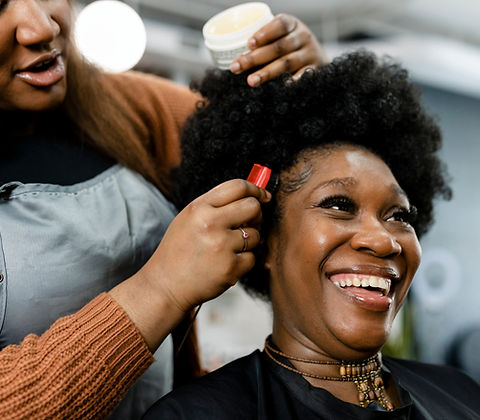blackgirlhairproject

i want you to think
Recognize that you are not a viewer — you are a participant. Having explored the profiles, please consider the questions posed at the end of the introductory video, as well as wherever else your mind takes you. I would like you to consider misogynoir (the intersection of antiblackness and misogyny) and how that is reflected through Black women’s experiences with our hair. I would like you to consider Black joy and Black pride and how that is reflected through our experiences with our hair. I would like you to consider the diversity among Black women, the ways cultural phenomena have changed over time, and the ways cultural phenomena have not changed over time. Finally, I would like you to consider your own preconceived notions about Black hair.

this website is for black women
To the Black woman participant, I hope you feel seen. I hope that if you are feeling insecure or self-conscious about your hair, that this project moves you one step further on your journey to Black hair confidence and self-love. I hope that if you are struggling and/or feeling alone in your hair journey, perhaps with no one to relate to, that this website reassures you that you are not alone; many women have gone through and are currently going through similar experiences, and you’re all in it together. I hope that if you have been on your hair journey for a long time, that you find solidarity with the women featured on the website. I hope that if you love your hair, you find this website a space to celebrate that love and an impetus to spread that love to more Black women and girls who could use it. I hope this website feels cathartic. I hope this website feels genuine. I hope this website makes you feel proud to be a Black woman.

this website is for everyone else, too
To the non-Black and/or non-woman participant, you are very welcome here. I would like you to come here, explore, and learn something new. Watch the video and read the stories with an open mind. Try to understand — really understand — what is so significant about Black women’s hair that makes it worth a whole project. Consider and reconsider any prejudices and biases you may have. Think about how you interact with Black women in your everyday life. Recognize that things that may seem small and inconsequential (like hair) can have a huge impact, and increase your awareness of these “little” things in your words, actions, and decisions.

i am a college student
My name is Vivienne Germain, and I am a third-year student at Harvard College studying English with a secondary in French. Some of my interests include literature, journalism, creative writing, web design, digital filmmaking, digital design and other multimedia content creation, all types of theater, feminism, racial justice, social justice more broadly, and voting rights. (That's me in the photo!)

this is a project for class
I created this website as a final project for a Harvard English department course entitled Digital Race Studies: Storytelling, Power, Community (English 90dr). In the class, we explored digital culture / digital humanities / multimedia storytelling focusing on (positive and negative) experiences of people of color, which involved narratives regarding culture, politics, racism, colonialism, immigration, violence, economic injustice, everyday life, celebrations of identity and community, and more. The final project is a digital storytelling project.

i took inspiration from the syllabus
I arrived at my digital storytelling project by taking inspiration from various course materials. Our class played a web-based game called “Hair Nah” (Momo Pixel), where the player must swat away intrusive white hands reaching to touch the avatar’s hair. I did not like the premise of the game because it seemed to normalize white microaggressions and shift the responsibility of handling it to Black women. My dissatisfaction urged me to think about Black women’s everyday experiences with hair and the significance of those experiences.

i took more inspiration from the syllabus
Additionally, we read digital journalism projects like Black Quotidien (Matthew Delmont) and the New American Journalism Project, which highlighted stories of various Black individuals and Latinx immigrants from their own perspectives. I thought it was really educational, important, and powerful to understand more about a certain phenomenon by learning about lived experiences from primary sources. So, I wanted to create a similar digital journalism project, on the topic of Black women’s hair. I decided to profile a wide variety of Black women as they discussed their experiences with their hair.